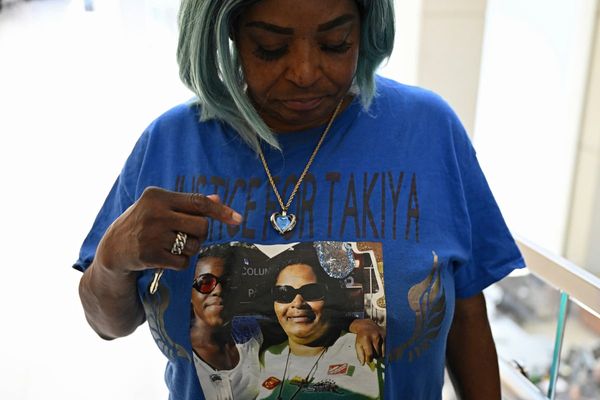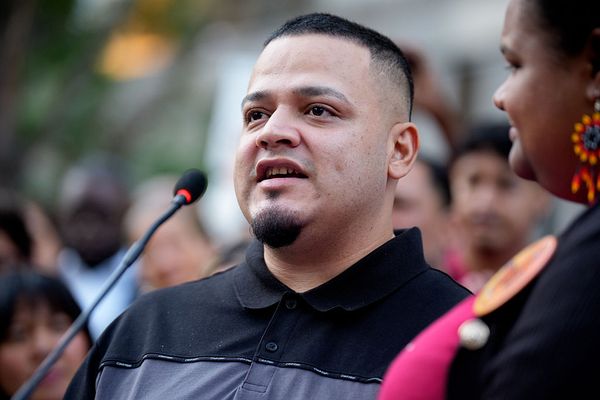
We’ve been here before: the Trump administration announces a roadmap towards peace in Ukraine that seems to be dramatically skewed towards Moscow’s demands; Volodymyr Zelenskyy gets on the phone to alarmed European allies; they quickly call Trump to message him that the whole idea is unworkable; the plan quietly dies. Rinse and repeat.
This time it feels a bit different, however. Reports on Friday suggested the US has threatened that if Ukraine does not sign a hastily concocted peace plan, Washington could withdraw intelligence sharing and other support critical to the Ukrainian war effort.
Zelenskyy addressed the nation, saying Ukraine was faced with a choice of “losing our dignity or the risk of losing our key partner”. He spoke of an extremely difficult week ahead, and of unbearable pressure being put on Kyiv.
The timing is particularly bad for Ukraine: the war’s fourth winter is shaping up to be its most difficult, as the country faces an acute power shortage after Russian attacks on infrastructure. Morale is flagging, people are exhausted and Zelenskyy’s inner circle is embroiled in a huge corruption scandal.
Trump, for his part, is in a hurry, reportedly keen to get a deal done before Thanksgiving next Thursday, and perhaps with one eye on the “Fifa peace prize”, apparently created solely as a gift to his ego, which he is expected to be given at the World Cup draw in Washington DC on 5 December.
That timeline seems like wishful thinking in the extreme, and as with any plan emerging from the Trump administration, there are more unknowns than knowns. Has Trump himself signed off on it? Has Putin? Is the plan meant to be a starting point for discussion or a final document? Did Rustem Umerov, secretary of Ukraine’s security council, agree to some or all of it during recent discussions with the US envoy Steve Witkoff in Florida? Is the plan that surfaced in the media even the “real plan”, or merely a draft leaked by the Russian side to get ahead of the game?
These are just a few of the many questions being asked by European leaders as they scramble to get to grips with another Trump administration move that has left them blindsided.
The odds seem stacked against this initiative bearing any lasting fruit, but ruling out entirely that Trump’s aggressive diplomacy could lead to some kind of deal would be premature. It could be a disastrous deal for Ukraine, however. Zelenskyy’s solemn bearing on Friday afternoon shows how worried he is about what is being put in front of him.
For all the public bravado, there has been a private admission in some parts of the Ukrainian elite that a deal may need to be done sooner rather than later, even if everyone sees Moscow as a bad-faith negotiating partner.
Some European intelligence services have also come to the conclusion that the military, social and economic conditions may compel Ukraine to sign a deal at some point soon. “Ukraine may need to make some very unpleasant compromises, including giving up territory and it may happen in the next six months,” said one European intelligence official earlier this autumn.
But the plan as it stands seems far too outlandish for Zelenskyy to be able to sell to his population. It would involve Ukraine withdrawing from some territory it still controls, agreeing to an amnesty for all Russian war crimes, and relying on vaguely defined US security guarantees – for which the US would apparently charge – to prevent another Russian incursion in a few weeks, months or years.
“This kind of proposal is not even worth the paper it’s written on,” said another European intelligence official, from a different country, referring to the plan’s assertion that Russia would not be expected to launch further military action.
Post-deal security guarantees have always been the key sticking point for any lasting peace, and if they rely on vague Trump-backed promises or Russian expressions of goodwill, few in Ukraine or Europe more widely will be convinced.
“What we see from the Russian side is that they have a strong feeling that they can influence the US administration in a way that is beneficial to them … but while such plans can be drawn up and discussed without Ukraine and Europe, I don’t think they can be signed or implemented without Europe,” the official said.







